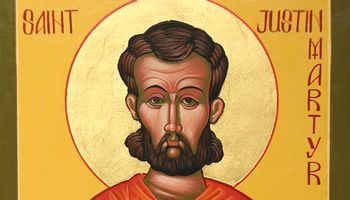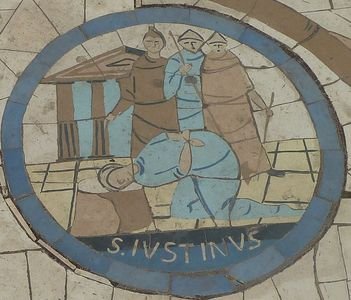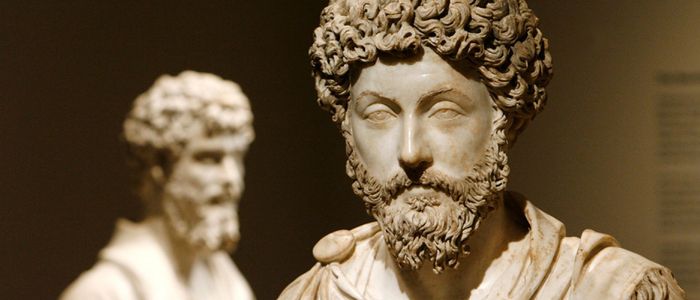Saint Justin, a martyr and a philosopher ( part 2)
Hello friends!
In the first post of my series I had the chance to talk about the ancient Greek philosopher Socrates. Through that post, I have presented what I consider some of the most important aspects of his life and thought ( You can find my first post here Paragons of thought ( part 1) ). The main points which I would like to readdress are the following:
- Socrates goal was to live a virtuous life and urged his fellow Athenians to strive for that as well.
- Socrates was more committed in searching about the truth than achieving material wealth.
- He was purposely accused of atheism, corrupting the youth and plotting against the city of Athens by his enemies.
- His trial was deemed a miscarriage of justice.
- He respected the verdict of the court against him even though he thought it was unjust, choosing to die instead of escaping.
Keeping those points in mind I'd like now to present the next person on this series of posts, an early christian apologist, a philosopher and a saint...

Life
Saint Justin was born in Samaria in 100AD, modern day West Bank, Palestine. His parents were most probably Roman or Greek citizens and was considered a Gentile, meaning non Jewish citizen.
From a very early age, Justin proved to possess an inquiring mind. According to his accounts, he came in contact with various philosophical schools like Stoicism, Pythagoreanism and Platonism. His investigations were centered around the concepts of metaphysics and ethics and his goal was to develop a sound belief system in relation to the true nature of things and the Divine. In his Dialogue with Trypho (1), Justin talks about his philosophical investigations. First, his contact with Stoicism left him dissatisfied as it did not provide any answer to his questions. Justin then found himself under the tutelage of a man belonging to the Peripatetic school but he again became quickly dissatisfied as it seemed to him that his tutor was more eager to acquire his fee rather than teach him about what he was searching for. Justin then came in contact with Pythagoreanism but he did not fulfill any of the requirements to study under this school. His tutor required him to learn music, astronomy and geometry first but Justin neither had deep knowledge of these subjects nor he considered those things as prerequisite to learn about what he desired. Ultimatelly Justin was influenced by the Platonic school after meeting a ''---a sagacious man, holding a high position among the Platonists---'' in his home town and decided to study the philosophy of Plato and this particular school. He was very satisfied with this current of thought and in his words:
...the perception of immaterial things quite overpowered me, and the contemplation of ideas furnished my mind with wings, so that in a little while I supposed that I had become wise; and such was my stupidity, I expected forthwith to look upon God, for this is the end of Plato's philosophy.
Examining the philosophical landscape of the 1st century AD one can find different schools and currents of thought co-existing throughout the extent of the Roman Empire. The old schools persisted in new forms, like Neoplatonism, but also various other trends that combined philosophy with spiritualism were also observed such as the imperial cult of Rome, the mystical religions of the east, early Gnosticism, the worship of the old Hellenic pantheon etc. At that time, the Christian faith also started spread beyond Judea. This was the age of the Apostles and it was also a time of fierce persecution.
Justin's conversion to Christianity came abruptly after meeting a man who, in a seemingly Socratic fashion, after a thorough examination of Justin's beliefs, concluded that no ancient philosopher or school had a sound conception and definition of the soul and God and the Divine(2). Instead, that man, urged Justin to study the Prophets of the Old testament as he said that these men (3):
... alone both saw and announced the truth to men, neither reverencing nor fearing any man, not influenced by a desire for glory, but speaking those things alone which they saw and which they heard, being filled with the Holy Spirit.
This man's advice to Justin was profound. Soon after, Justin renounced his already formed beliefs and dedicated himself into learning more about Jesus Christ and the newfound Christian faith. In his words, taken again from his Dialogue with Trypho (4):
But straightway a flame was kindled in my soul; and a love of the prophets, and of those men who are friends of Christ, possessed me; and whilst revolving his words in my mind, I found this philosophy alone to be safe and profitable. Thus, and for this reason, I am a philosopher. Moreover, I would wish that all, making a resolution similar to my own, do not keep themselves away from the words of the Saviour. For they possess a terrible power in themselves, and are sufficient to inspire those who turn aside from the path of rectitude with awe; while the sweetest rest is afforded those who make a diligent practice of them. If, then, you have any concern for yourself, and if you are eagerly looking for salvation, and if you believe in God, you may--since you are not indifferent to the matter -- become acquainted with the Christ of God, and, after being initiated, live a happy life."
At that moment, Justin decided to be a philosopher himself. Having developed his Christian worldview ( and also being somewhat influenced by his former Platonic beliefs ), he started travelling around Judea and Asia Minor and eventually found himself at Rome where he established his own school, discussing and teaching about the new Christian faith.
Perhaps the most known notable incident in that time was his quarrel with the cynic philosopher, Crescens. Crescens was a highly critical of the new faith and, among other charges as well, blamed the early christians as atheotatous, which is the superlative of the atheist. Justin's response to this charge was that first, Crescens, had not seriously studied the christian doctrines and proved that his accusations were unfounded. Secondly he said that indeed Christians were atheists, but only in relation to the old pagan gods as they did not believe in them but instead believed and professed a single God and accepted Jesus Christ as His Son, who died in the cross and raised after three days from His grave (5). As I examined in my previous post about Socrates, in the trial set up against him, the charge of atheism along with the one of corrupting the youth of Athens, was perhaps the main one and the most serious. Here we can see a strong parallel between the accusations put forward by Crescens against early christians and those put against Socrates by his political enemies.
Crescens was also harshly criticised by Justin's student, Tatian. In his Adress to the Greeks, he accuses Crescens of indecency and immoral behavior (6) as well as fear of death, thus denying that Crescens is a true philosopher but rather a sophist under the influence of evil powers and spirits. Justin's dispute with Crescens made him fearful that eventually the latter would plot against him and seek his death. According to Tatian and later Eusebius (7) , Justin was indeed denounced by Cresencs to the Roman authorities.
Eventually, Justin and six of his companions, were tried by the Roman authorities and sentenced to death. Saint Justin and his students were beheaded with the exact year of their Martyrdom being circa 162-168 AD.

Impact and thought
Saint Justin the Martyr is perhaps one of the first christian Saints and apologists who vigorously defended the newfound Christian faith against the attacks of the contemporary philosophers, the Jewish clergy and the Roman authorities, using reasonable arguments against his accusations while firmly standing on his belief on Jesus Christ as the Messiah. He was highly critical of Judaism and was perhaps the first to formulate the concept of a Jewish Deicide.
Only three of his written works are extant. One of them is a dialogue with Trypho and the other two are his apologetic letter and its revision, adressed to the emperor of Rome Antoninus Pius and his sons, Marcus Aurelius and Lucius Verus. In his dialogue with Trypho, Saint Justin talks about his former education, his philosophical inquiries, his conversion to Christianity and in the end he gives reasons and defends his faith against the accusations of Trypho. Schloras have not yet decided on the true identity of Trypho with some claiming that Trypho was a Jewish Rabbi and others claiming that, in a similar Platonic fashion, Trypho is an imaginary person used by Saint Justin to advance his arguments.
In his apologetic letter adressed to the emperor of Rome, Saint Justin's goal is not so much to proselytize but more to defend his brethern against unjust persecution and punishment. His letter is based on two pillars. The first one is the defense of his faith and the condemnation of the pagan beliefs as demonic in nature. The second pillar is the defense of his Christian brethern invoking the Roman law. In these parts Saint Justin accuses those persecute them for doing it simply because they are called Christians and not for doing any wrongful act, providing also accounts of such incidents (8)(9).

St. Justin understood that it was imperative to state the relation of the Christians to the state that they belong. In this part of his apology he uses the famous verse from Luke's Gospel ''Render unto Ceasar the things that are Cæsar's, and to God the things that are God's.''(10). The precise excerpt from his apology is the following (11):
And everywhere we, more readily than all men, endeavour to pay to those appointed by you the taxes both ordinary and extraordinary, as we have been taught by Him; for at that time some came to Him and asked Him, if one ought to pay tribute to Cæsar; and He answered, "Tell Me, whose image does the coin bear?" And they said, "Cæsar's." And again He answered them, "Render therefore to Cæsar the things that are Cæsar's, and to God the things that are God's." Whence to God alone we render worship, but in other things we gladly serve you, acknowledging you as kings and rulers of men, and praying that with your kingly power you be found to possess also sound judgment.
One of the most notable parts of his revised apology is the part where he compares Socrates to Jesus Christ (12). Here Saint Justin makes the claim that Socrates and other ancient philosophers such as Plato and Heraclitus were in effect, unkowingly, Christians, in the sense that much of their philosophical inquiries were in tandem with the Christian Logos aka the Word, which is Jesus Christ. At this point he says that their researches were partially inspired and contained parts of the Word and, although these philosophers were more ancient at human birth than Jesus Christ, their commitment at searching for the truth has partially led them to contemplate on things that would later be fully revealed by Jesus Christ. He considered this as a partial revelation from God to them, the Gentile philosophers, and compared this to the revelations of God to the old prophets of the Jewish people.
In this point it is also very interesting to note one thing that I ommited from my previous post, Socrate's daimonion. According to Socrates, from a very young age, he was accompanied by something that he called a daimon, at that time meaning spirit, which only gave him negative advice on what he should not do and never the opposite (13). He gives praise to this spirit, citing it as the reason he became a true philosopher. In his exact words presented by Plato (14):
...for his backsliding from philosophy, but his sickly habit of body keeping him out of politics holds him back. My own case, the divine sign,1 is hardly worth mentioning—for I suppose it has happened to few or none before me. And those who have been of this little company and have tasted the sweetness and blessedness of this possession and who have also come to understand the madness of the multitude sufficiently and have seen that there is nothing, if I may say so, sound or right in any present politics, and that there is no ally...
Here lies another strong parallel between St. Justin's argument on the Divine inspiration of some Greek philosophers and the claim of Socrates. Socrates's examinations have led him to a similar conclusion, mostly that many of the poets, artists and craftsmen were actually divinely inspired. In a dialogue written by Plato, Socrates discusses this matter with Ion, a very gifted rhapsodist who is claimed to posses excellent skill at interpreting Homer. Socrates argues that this skill of his is a gift from the Muses stating that (15):
I perceive, Ion; and I will proceed to explain to you what I imagine to be the reason of this. The gift which you possess of speaking excellently about Homer is not an art, but, as I was just saying, an inspiration; there is a divinity moving you, like that contained in the stone which Euripides calls a magnet, but which is commonly known as the stone of Heraclea.
St. Justin most probably knew that his apology and beliefs would put him in grave danger and he chose to stand firm in his position. Much like Socrates in his trial and the charge of atheism, St. Justin and his companions were accused simply of being Christians ( as thousand others at that time ), without doing any unlawful act, and were executed for that. One can see that the parallel between these persons is very strong and very similarly, they all stayed true and loyal to their beliefs until the very end, scorning death and eventually gaining recognition even after hundreds of years.
In the next post I will discuss about the Danish philosopher, Søren Kierkegaard, considered the first existentialist philosopher and talk about his passion for Jesus Christ, his anxious nature and his critical attitude against the fake Christian attitudes, as he perceived it, of the society in his time.
Thank you for reading!
References:
1: St. Justin, Dialogue with Trypho, Chapter II
2: St. Justin, Dialogue with Trypho, Chapter VI
3: St. Justin, Dialogue with Trypho, Chapter VII
4: St. Justin, Dialogue with Trypho, Chapter VIII
5: The Second Apology of St. Justin Martyr, Chapter 3
6: Tatian, Adress to the Greeks, Chapter 19
7: Eusebius, Church History ( Bokk IV), Chapter 16, Verses 7-8
8: St. Justin, The Second Apology of St. Justin Martyr, Chapter 2
9: St. Justin, The First Apology of St. Justin Martyr, Chapters 4 and 7
10: Gospel of Luke, 20:25
11: St.Justin, The First Apology of St. Justin Martyr, Chapter 17
12: St Justin, The Second Apology of St. Justin Martyr, Chapter 10
13: Plato, The Apology of Socrates, Section 31c
14: Plato, The Republic, Book 6, Section 496c
15: Plato, Dialogue with Ion
Images taken from:
1: http://fatherkevinestabrook.blogspot.gr/2015/06/homily-june-1-st-justin-martyr-apologist.html
2: https://en.wikipedia.org/wiki/Justin_Martyr
3: https://www.circeinstitute.org/blog/where-classical-meets-christian-what-marcus-aurelius-can-teach-us-today
At this point I would also like to thank the moderators of the facebook page, Socrates Memes, for enabling this platform and sharing anecdotal and insightful memes on the thought and life of Socrates, as well as the persons with whom I engaged in dialogue in that page, I am very grateful for all the conversations I have had there. Do check them out!
Ah here you are :) I was already waiting for the updates :)
Sorry for the delay @hanen but my pc is acting a little strange lately. I had to fix it first in order to post something new as I only log to steemit through here. Next one is coming this weekend and hopefully I will finish the series by the end of the next week :)
This post contain information about Saint Justin the philosopher. thanks for share this learning post.
You're welcome. I'd love to learn which part you liked most ^^
I liked most to possess an inquiring mind.
Indeed he did. He also possessed a willing heart.